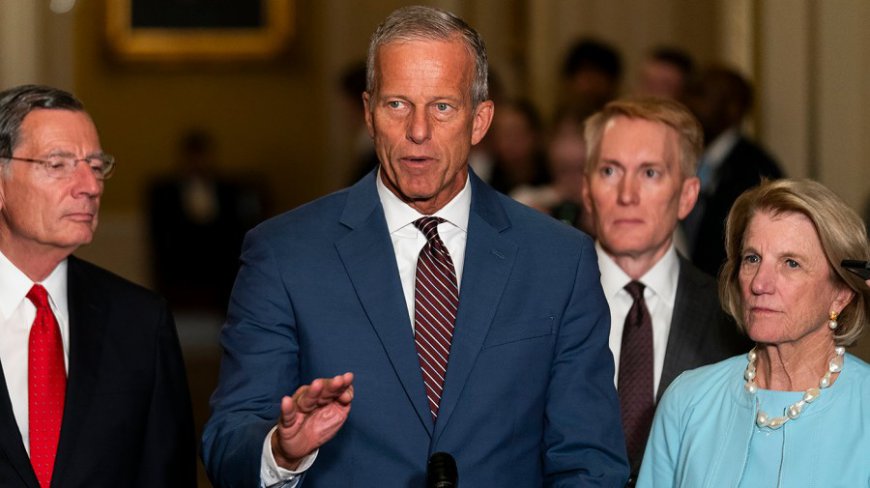Senate GOP nails down deals on DOGE cuts in bid to avoid tax bill tumult
Senate GOP leaders are looking to avoid a repeat of the lengthy and sometimes bewildering floor process that led to the passage of the Trump tax bill by locking down key details with holdouts before the chamber moves to a vote-a-rama Wednesday on a bill to claw back funding. A number of rank-and-file members indicated...

Senate GOP leaders are looking to avoid a repeat of the lengthy and sometimes bewildering floor process that led to the passage of the Trump tax bill by locking down key details with holdouts before the chamber moves to a vote-a-rama Wednesday on a bill to claw back funding.
A number of rank-and-file members indicated in recent days that they hoped leadership would do everything possible to sidestep the tumult that engulfed the conference days before July 4 and limit the side deals that were being worked out at the last minute.
All indications Tuesday were that leaders were attempting to do just that. They resolved two key issues — protecting the President’s Emergency Plan for AIDS Relief (PEPFAR) program and some rural broadcasters — a day before a key vote-a-rama is set to happen.
Congress has until Friday to send the bill, known as a rescissions package, to President Trump’s desk. It contains a request to claw back $9 billion in already appropriated funds for foreign aid and public broadcasting.
“Thune’s been really transparent on all of this,” Sen. Shelley Moore Capito (R-W.Va.) said, pointing to the pre-vote-a-rama effort and push to limit potential side deals.
The White House and Senate GOP members made massive strides Tuesday toward a potential final green light to pass the bill.
Early in the day, Sen. Mike Rounds (R-S.D.) announced he was on board with the package after striking a deal to ensure radio stations in tribal communities continue to receive funding. He had been concerned about the effect cuts to the Corporation for Public Broadcasting — which helps fund NPR and PBS — would have on Native American areas that rely on those stations.
Rounds told reporters that the administration is reallocating Biden-era “Green New Deal money” to fund those broadcasters, unlocking his vote in the process.
“I think it was caught in the crossfire,” Rounds said about the provision. “They understood my concern. They recognized this is not something people necessarily wanted to cut out. These were not part of the targeted groups that a lot of folks have problems with, and they provide a real service in rural areas.”
The bigger news came hours later, when negotiators announced that planned PEPFAR cuts were out of the bill entirely, potentially unlocking the support of multiple moderates who had fretted about their inclusion, including Sens. Susan Collins (R-Maine) and Lisa Murkowski (R-Alaska).
Neither moderate has said how they will vote.
The move also strips $400 million from the bill, bringing the rescissions total down from $9.4 billion to $9 billion.
“White House is supportive. Everybody’s on the same page,” Sen. Eric Schmitt (R-Mo.), the lead sponsor of the bill, told reporters.
The news emerged after Office of Management and Budget Director Russell Vought appeared at the weekly Senate GOP luncheon to discuss the package, which statutorily must be completed by Friday.
“It’s substantially the same package, and the Senate has to work its will and we’ve appreciated the work along the way to get to a place where they’ve got the votes,” Vought said after lunch. “There is a substitute amendment that does not include the PEPFAR rescission and we’re fine with that.”
Murkowski and Collins were the foremost opponents of the cuts to PEPFAR, which was launched by former President George W. Bush more than two decades ago.
Collins had already shown her potential independence by voting against the Trump tax bill last week, while Murkowski demanded a number of last-minute deals to secure her vote.
Senate Majority Leader John Thune (R-S.D.) told reporters after lunch that there was “a lot of interest” in making PEPFAR changes, labeling it a “small modification.” He also believes the change will not cause issues across the Capitol — because the Senate is making changes to the bill, it must return to the House before heading to Trump’s desk.
“I wouldn’t say anything’s prebaked,” Thune said when asked if the topic was run by Speaker Mike Johnson (R-La.). “Obviously, it’s something we’ve been working closely with the administration on, and my assumption is that the level of coordination that we’ve had ... that they [the House] would take [it] up.”
Rank-and-file Senate GOP members still hope leaders limit further changes by the time it hits the lower chamber.
“It would be nice if we didn’t have to inflict so much pain on ourselves,” Sen. Kevin Cramer (R-N.D.) told The Hill. “How bad can it be?”
“Some people want to refine the rescissions a bit. They want more detail,” he continued. “I’m with it as it is. … It’s just time to rein some of that back in.”
Nevertheless, some members are seeking further changes via the amendment process.
“Sure, in an ideal world. But this is legislating,” Sen. Josh Hawley (R-Mo.) said about the prospect of cutting out side deals.
Hawley noted plans to file an amendment that would add $5 billion more in cuts to the package in a bid to slash a “Green New Deal loan” that would affect his state, though he said he wasn’t even sure it complies with the rules of the pending vote-a-rama.
“I’d like to make it bigger,” he added.
What's Your Reaction?
























